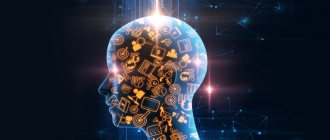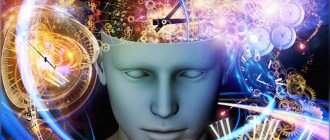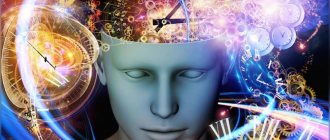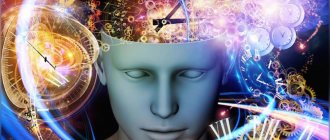People often wonder what human intelligence is and how it relates to psychology. Therefore, in this article I will explain in detail what is meant by this term.
This is a complex of abilities to learn, understand, solve complex issues and find a way out of difficult situations, as well as the ability to think. Society greatly respects this quality and recognizes its value, but does not always characterize it correctly. For many, the traits of an intellectual are encyclopedic knowledge and excellent memory. In fact, they are associated with erudition.
Definition of Intelligence
It represents something of a taste for ideas. The chain is as follows: thinking processes the life experience we acquire and accumulates knowledge, with their help new ideas, discoveries, inventions, and innovations are born. This is a thought process that is impossible without abilities. Some are given more of them, some have less. This is human intelligence. If its level is low, there will be little benefit from knowledge. Readiness and awareness are just tools that help it manifest itself. Having a lot of knowledge without the ability to use it is the same as playing the violin without talent.
What characterize intellectual skills:
- Memory;
- skills of analysis, structuring information and forecasting;
- logic;
- attentiveness;
- zeal;
- reproduction;
- flexibility, depth, inquisitiveness of mind;
- curiosity.
Your opinion is important to me
I do not pretend that the written interpretation of such broad concepts as mind and reason in this article was perceived as the only correct one, since I understand that there are other points of view on this matter, that this topic affects deep understandings and can cause discussion and possible disagreement, and a completely different awareness of their meaning. It’s not like you can sort apples and pears, but everything is much more complicated. I encountered huge differences in the interpretation of the meaning of these words when I was preparing to write this article and re-read the interpretation of the terms in various dictionaries and reference books. My goal is to understand the true meaning of everything that surrounds and what is inside us. I am collecting pieces of it bit by bit for myself and for you. If the information in this article was useful to you and opened up a new understanding of important concepts and meanings, then I am absolutely happy. And yet, I would like to hear your opinion on this matter, which I will be happy to read in the reviews to this article.
Share link:
- Click to share on Twitter (Opens in new window)
- Click here to share content on Facebook. (Opens in a new window)
Liked this:
Like
Types
Until now, there is no unified classification of intelligence. Only one scientist, Howard Gardner, put forward the theory of 8 varieties:
- Spatial, most developed among drivers and designers. Characterizes the ability to navigate the terrain. If you are having difficulty building a route, this is what you need to develop. This can be done by solving problems with finding a way out, painting and sculpting, and tracking the movement of objects.
- Kinesthetic, responsible for the ability to use one’s own body, dexterity, and coordination. Those who have it developed dance and work well. Sports, yoga, and physical activity will help in its development.
- Musical, gives its owners a sense of rhythm, hearing and understanding. The more a person immerses himself in music, dancing, listening, singing, the more he will improve this type of intelligence.
- Linguistic, responsible for written and oral speech, develops when studying foreign languages, reading, communicating with people.
- Logical, allows you to feel like a fish in water among symbols, signs and diagrams. Will be an excellent companion for a scientist and inventor. To improve logic, you need to solve problems, puzzles and puzzles, and build chains.
- Interpersonal, also known as social, is close to empathy. This is the ability to feel and understand people, ease in building relationships, sociability and communication. It is important for creating a family and forming friendships. He is trained at seminars, trainings, and group games.
- Emotional is needed to understand yourself, to live in harmony with your inner world. It is especially difficult to develop, therefore it requires the use of spiritual practices: meditation, purification, reflection.
- Naturalistic is associated with worldview, natural phenomena, and physical laws.
Any type of intelligence in psychology is based on the development of personality traits and determines its individuality.
Designation
The mind is a person’s abilities that are associated with the perception of information, its processing and use in life. When someone is advised to act wisely, it means that one should put aside emotions and use reason.
The subconscious plays its own role in mental activity. There are theories according to which not only humans, but also some animals have intelligence.
Intelligence acts as a quality of the psyche and includes the ability to cognition, learning, accumulating information, systematizing knowledge, seeing logical connections, etc. A person who has a well-developed intellect and is able to think analytically is called an intellectual.
Structure
The processes in our head are so complex and diverse that they are not subject to structuring according to several criteria. Comparing a talented mathematician with a brilliant composer is difficult and unproductive.
Psychologist Daria Milai
Make an appointment
J.P. Guilford presented a three-dimensional cubic model in which he identified 120 mental abilities (memory, analysis, assessment, expression of thoughts, etc.) and structured them into three components:
- Content (what we think about).
- Operation (as we think).
- Result (what the process leads to).
Some people are able to quickly draw conclusions and make decisions, others are close to flashes of insight with an instant understanding of the essence (remember Archimedes with his “eureka”), others are fixated on the assumption that came first. An intellectually developed person can live happily all his life, while thinking haphazardly and impulsively, without going beyond standards and stereotypes.
Where to begin
Brain, mind, intelligence, intellect, consciousness and the unconscious - what unites these meanings and what is their fundamental difference? Each person has his own subjective understanding of the meaning of these words. I have long been interested in how they are similar and how they are different, what follows from what and what interacts with what. At first glance, these terms are largely similar in meaning, but in fact, I want to divide them into two completely different groups.
When I decided to write this article, I had some idea of what I would write about. And yet, before starting, I looked at information about this in various sources. I also used a translator to check if there was a difference in the meanings of these words in the English version. This didn't give me any results. During translation, many meanings overlapped with each other. For example, “mind” means mind and intelligence, attention and even soul in a certain context. As for explanatory dictionaries, in some of them the author’s interpretation agreed with my opinion, and in others it was absolutely opposed. Having collected all the information and my personal understanding together, I took the risk of sharing with you what I ended up with. Let's understand these concepts together.
Main function
The value of mental abilities is that they help you think productively. Thanks to them people:
- self-realization and self-affirmation;
- achieve success and demonstrate talent;
- master new skills and gain knowledge;
- occupy a position in society.
The list can be continued by the fact that intelligence and insight from ancient times to the present day help to survive, get settled, start a family and raise children. Therefore, the main thing for which they are responsible is the ability to integrate into society, adapt and find their place, and to do this profitably and quickly. The mind protects us from dangers. Levels of intelligence in psychology are divided into:
- Short. People in this category are weak and dependent, passive and submissive. They definitely need care and support, the world around them seems complex and aggressive, and the manifestation of initiative and their own talents is meaningless and time-consuming.
- Average. Characteristic of those who have good mental abilities, independence and activity. They easily adapt to society, are not afraid of everyday problems, apply their knowledge and skills, find a social circle and the opportunity to express themselves.
- High. A special caste of “revolutionaries and wizards”, which is above adapting to the world. It is easier and clearer for them to change their environment to suit themselves than to change their own values. Of course, they are a minority.
Information storage
If our consciousness is responsible for the mind and intellect, then the mind is the area of the unmanifested reality of the unconscious world (Fig. 1).
Rice. 1. Location and distribution of mind, intellect and intelligence
Man as a cosmic being is connected to two information repositories. One is our ordinary human brain, and the second is the giant brain of the universe. It is called by different names: collective unconscious, cosmic mind, Akashic Chronicles, etc. So, our first physical brain regulates the processes of mental activity, intellect, memory, consciousness, and the brain of the universe regulates and fills our Mind with information. Just imagine what a colossal experience this is of entire generations and civilizations, accumulated in this universal library. And all this knowledge is available to us if we learn how to obtain and use it correctly.
Individual characteristics
The traditional concept in psychology distinguishes the classification into three types of intelligence:
- Innate, which cannot be learned and instilled.
- Social-behavioral, which can be traced in actions and statements
- Assessable, it is measurable through psychological tests.
People differ not only in the presence of abilities, but also in their qualitative characteristics, a set that is characteristic of the individual. It is impossible to say unequivocally that a talented artist will be the same in dancing. But the fact that differences in the level of mental activity are noticeable almost from birth is possible.
Face-to-face consultation
What are the features and advantages of face-to-face consultation?
Find out more
Skype consultation
What are the features and benefits of Skype consultations?
Find out more
If a child shows curiosity about the world around him, causes a lot of trouble by unwinding toilet paper, knocking over food, or dragging a domestic cat by the tail - rest assured, this is a sign of high intelligence. But the quiet one, with whom, according to the parents, they were lucky, is unlikely to stand out with a high level of IQ. To evaluate it correctly, assessment techniques are used in the form of tests with different tasks for different age categories.
What does intellectual level depend on?
We receive a certain set of qualities from birth, by inheritance. It is impossible to influence them. But we are talking about only half of the skills. The other is acquired during growing up and depends not only on natural data: the mobility of neurons, reaction speed, the nature of the nervous system, but also on the social environment in which the personality develops.
The emotional connection between the child and mother is of particular importance for the development of mental abilities. Children who are surrounded by love, affection and care show better results on intelligence assessment tests.
Age differences
Measuring intelligence in the same person at different ages will give interrelated results. That is, if a child at 5 years old was distinguished by intelligence and intelligence, indicators of brain activity. most likely to remain high at 20 and 40 years of age. However, a 100% guarantee cannot be given.
For example, Pascal, being 13 years old, participated in meetings of the academic council on mathematics, and Einstein at the age of 15 was expelled from school for poor performance.
Comparing the indicators of different age groups, we will see certain patterns:
- the coefficient increases until the age of 17-18, slowing down during transition periods when the brain is “busy” solving other issues;
- after 20 years, development slows down significantly;
- logical, analytical and arithmetic potential is revealed by the age of 30;
- medicine is easier at the age of 40-45, psychology after 50;
- All years are submissive to art; researchers have not established restrictions.
An interesting fact is that there is no obligatory regression of intellectual activity. Of course, in older people, physiological processes affecting the cerebral cortex are disrupted, but a person gains important life experience that helps him apply the knowledge that he has accumulated.
Gender differences
Although the stereotype about the huge difference in mental abilities of the stronger and weaker sex is constantly discussed in society, no one has yet been able to scientifically substantiate the existence of an “intellectual gap.” Indeed, the average level of intelligence is approximately the same for men and women. The difference is observed in the following aspects:
- girls under 15 develop much faster than boys;
- Males are better able to shine with mathematical talents, while women are distinguished by the development of speech, emotional activity and creative skills;
- The priority of the fair half is non-standard thinking.
What factors influence a person's mental abilities?
The level of intelligence can vary significantly among different people. Among us there are intellectuals, slow-witted people, people with average abilities and those who are commonly called mentally retarded. But why are people so different mentally?
Various studies have shown that the formation of human mental abilities is influenced primarily by genetic factors. Upbringing, environmental influences and random external influences play a much smaller role.
However, the external environment also has a certain significance for the formation of intelligence. These are factors such as the standard of living of the family, the level of education of parents, the nature of upbringing, the availability of school education for children (in American studies, students from good urban schools turned out to be more intellectual than students from modest rural schools). Research has even established the influence of such individual factors as annual family income, the size of the house and its cost, the relationship between parents, etc.
The role of nutrition cannot be ruled out. The brain is a rather voracious structure, and a lack of nutrients can lead to a decrease in its ability to process information.
Diagnostics
Intelligence studies are carried out on the basis of various methods and techniques. All of them are based on two principles: testing and experimentation. For example, logical thinking and pattern identification skills are revealed using Raven's progressive matrices. Amthauer tests specialize in orientation in professional activities. Both the first and second technologies are developed for people of different ages. To evaluate a child, the Goodenough-Harris method is suitable, which gives an assessment based on a child’s drawing. All these developments are decades old, they are unified and give average readings.
Ask a question
Comparison
Comparing the two concepts, it is noteworthy that in any case we are talking about certain knowledge. But the difference between the mind and the intellect is this: with the help of the intellect, a person, as it were, accumulates such knowledge, and by using the mind, he uses it in life.
In other words, people owe more to their mind than to their intellect to perform adequate actions. The intellect stores ready-made information and contains ready-made answers.
However, in an urgent situation, when changing circumstances require making an important and necessary decision, intelligence will not replace the mind. One of the properties of the mind is the ability to predict the results of various actions.
By thinking and using the mind, a person has the opportunity to avoid unnecessary situations and prevent unused conflicts.
You can understand the difference between mind and intelligence by comparing the meanings of the expressions “a reasonable person” and “a person who has intelligence.” In the first option, we basically mean someone who not only has a store of knowledge, but also acts correctly.
And the possession of intelligence is associated with being well-read and erudite. The mind can be called the basis for intelligence.
Moreover, moral nuance also plays a big role here. After all, intelligence without positive motivation can be scary - in this case, knowledge is sometimes used not for good, but to achieve selfish, evil goals.
Recommendations for increasing the coefficient
5 practical tips for training your brain activity and increasing your IQ that you can use every day:
- Challenge your brain, solve math problems, learn foreign languages, learn to play a musical instrument.
- Talk to educated people. By having a conversation and understanding the way smart people think, you will benefit for yourself.
- Play computer games that require strategy development and train your reactions.
- Read books, it develops vocabulary and erudition.
- Play sports, lead a healthy lifestyle.
How to increase IQ?
Development methods are simple and obvious. Here are 9 recommendations:
- Train your brain and memory. Good examples: solving math problems, memorizing phone numbers of friends and dialing them without consulting the phone book.
- Watch your diet. With food, necessary substances enter our body. The functioning of the brain depends on some. If the diet is of poor quality, the likelihood of problems with mental activity will be high.
- Don't overexert yourself. Your waking and sleeping patterns should be balanced and suit you.
- Read books. There is no need to talk about the usefulness of reading.
- Find an intellectual hobby or passion. Plus - the opportunity to do interesting things for yourself and “pump up” your IQ.
- Learn new things. An example is learning a “cute” foreign language.
- Watch educational films. Comedies and action films, thrillers are all great, but your weekly “bill” should always include some kind of film made by, for example, National Geographic.
- Try to start studying what you have long wanted. Maybe as a child you liked topics related to space? Then forward to the “stars”.
- Don't let routine “devour” you. Change your habits, rearrange your home, take different routes to work.
How to increase a child's intellectual abilities?
Here are recommendations to help children develop:
- teach them to eat properly and exercise regularly;
- Make sure that your study, activity and rest schedule is balanced. Mental and physical fatigue negatively affects the development of a fragile organism;
- teach children to read. It is not at all necessary that they are only interested in books from the school curriculum;
- Offer intellectual games such as Monopoly and chess during joint leisure;
- enroll your child in a foreign language course;
- Offer joint solutions to various intellectual problems and passing IQ tests.
If all the advice presented during practical implementation is combined with love and care for the child, he will become very smart. And over time, everything that you taught your child will become part of his habits.
How to increase intelligence in an adult?
Read the section “How to increase your IQ.” There are some good recommendations there. You can improve your score if you strive to follow them.
Emotional intellect
The concept of IQ includes the ability to distinguish between emotions, understand what motivates other people, what they want, what they strive for and what they achieve. It is he who helps manage his own and other people’s feelings to achieve goals.
Our mind can be roughly divided into two halves: rational, which is responsible for cognition, thoughts, conclusions, and impulsive, devoid of logic, but no less influential. Ideally, we should balance and make friends between these parts.
The IQ component is character. Emotional appearance includes skills:
- believe in yourself;
- sympathize;
- control emotions;
- be able to distract yourself from unpleasant experiences;
- strive for a goal;
- find motivation.
What is the mind?
Homo sapiens, that is, “reasonable man,” is the name of our species. A reasonable person is one who knows how to reason and think rationally .
Reason is the highest type of mental activity, the ability to think rationally and creatively. It is also the ability to think in broad, abstract and spiritual categories.
The term can be literally translated as “enlightened mind.” Have you heard the expression “mind games”? What do you think it means? It means that your mind has taken control of you and is deceiving you.
To resist games, you need to turn off the autopilot and regain awareness and control . That is, your mind has failed and given way to the mind.
Sometimes rationality is equated with wisdom. Psychologists also note that the mind is connected with the human will.
Function
The function is to determine what is good and bad, right and wrong, useful and unhelpful. Simply put, it helps a person to be human, that is, to be humane and social.
Social intelligence
It helps to correctly interpret the behavior of others and build relationships between people. The better it is developed, the more adapted you are to life in society. If this part of mental activity is highly developed, it will not be difficult for you to predict the reaction of your interlocutor or immediately make a judgment about someone without thinking for a minute. It is more a gift of accommodation than of deep and thoughtful understanding.
Levels of Consciousness
Switches of the Mind, according to David Hogins, are levels of human consciousness. He identifies 17 levels of consciousness on a scale from 20 to 1000 points.
Any person is at a certain level of consciousness and can increase or decrease it throughout his life. If everything is good enough and the situation is as favorable as possible, then an incorrect judgment may be formed that the person has reached a sufficiently high level, but when he finds himself in bad conditions, the person slides down to his own true level of consciousness.
A stable level position is determined by a person’s behavior and his attitude towards the world when he finds himself in an uncomfortable, unfamiliar and negative environment. You can read more about the levels of consciousness in D. Hawkins’ book “From Despair to Enlightenment.” In this publication I will list them briefly:
Guilt, reproaches, accusations – 30 Fear, anxiety, excitement – 100
Racial differences. Sergey Savelyev (Brain Blow #39)
Desires, thirst, envy – 125
Neutrality, permission – 250 Joy, goodness, peace – 540
Only starting with 200 points, from the level of courage, a person begins to live, up to this level he only survives and is in the process of fighting with himself, with the world and with nature. At the highest levels of consciousness there are a few such world-famous people as Issus, Buda, Muhammad and the rest of the enlightened ones.
They have fully opened the Mind, comprehended the secrets and laws of existence and bring them to the world. It doesn’t matter what level we are at at the moment, but we can and must increase it throughout this life and beyond.
It is necessary to remember that moving to the level of pride can easily throw you back into shame if you do not grow further and further, developing and opening your own Mind. And his capabilities have no limits and any superpowers are only a separate part of them.
Excellent prospects, don’t you agree? And intelligence and understanding can help you live in comfort and safety.











